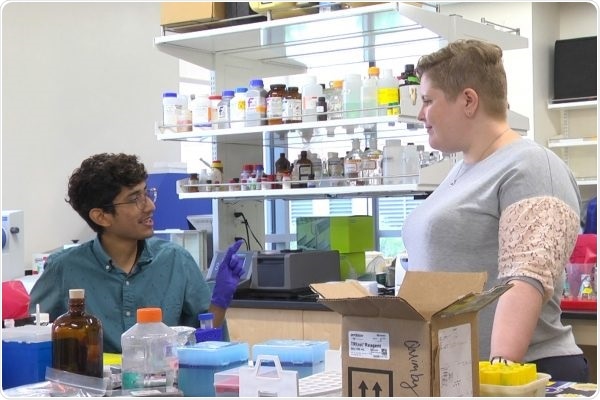One major threat that the world faces and researchers are working to combat today is antibiotic resistance, and six Cornell Summer Research Institute (CSRI) students are doing their part in the fight.

Assistant Professor of Biochemistry Catherine Volle and Jonathan Azenon talk about their research during a day in the lab. Image Credit: Cornell College.
I think what we are doing is laying the groundwork for something in the future that could be a lot bigger than any of us, and the fact that we are all a part of that is kind of really cool.”
LeCaine Barker, Junior, Biochemistry and Molecular Biology Major, Cornell Summer Research Institute
As stated by the Centers for Disease Control and Prevention (CDC), antibiotic resistance occurs when germs like bacteria develop the ability to defeat the drugs created to kill them. It is a problem that affects 2.8 million people every year.
“Right now there’s a rise in superbugs with an overuse of antibiotics because bacteria are just really good at mutating. They are actually becoming resistant against a bunch of antibiotics,” adds Jonathan Azenon, sophomore, biochemistry, and molecular biology, and French double major.
Azenon further states, “And if we don’t come up with new ways to combat these bacteria, infections are soon going to be the leading cause of death again in the world. This is something we are trying to prevent.”
As the problem is related to the world’s current repository of antibiotics, the team is analyzing novel and interesting ways to kill disease-causing bacteria. The laboratory’s prime focus is to analyze and understand antimicrobial peptides, a defense mechanism that the human immune system already uses to fight against the disease.
It’s really hard for bacteria to adapt to antimicrobial peptides. The process can happen but it’s relatively slow. Antimicrobial peptides are not necessarily going to make a good drug in and of themselves, but the more we understand how they kill this bacteria, we can then pass that information along to people who are actually designing new antibiotic compounds to say—let's mimic what the immune system is doing already.”
Catherine Volle, Assistant Professor, Biochemistry, Cornell College
The group is also researching how predatory bacteria can be employed to fight against harmful bacteria.
“I’m looking at this new bacteria, a predatory bacteria, called Bdello, or Bdellovibrio, and what Bdello is doing is it likes to eat other bacteria. It’s really cool. It’s kind of like an alien,” Azenon adds.
Certain students are also looking into the problem from a molecular perspective.
Annika and I are focusing on a part of the bacteria Called Lipid A. It makes up the majority of the outer surface of the bacteria. We are interested in changing that structure.”
Alexander Bajoon, Junior, Biochemistry and Molecular Biology Major, Cornell Summer Research Institute
Research is the means to contribute to the pertaining problem of antibiotics resistance that scientists around the globe are studying. Volle started investigating Bdello as an undergraduate and has expanded her work.
She has her own lab, which was started six years ago, and works in conjunction with a team of researchers at other schools who are using grant dollars from the National Institutes of Health.
Cornell Summer Research Institute: Biochemistry and Molecular Biology
Video Credit: Cornell College.